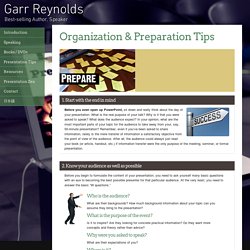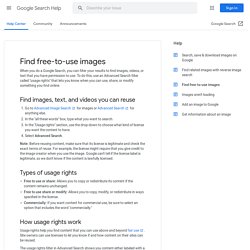

Garr Reynolds Official Site. Organization & Preparation Tips. Before you even open up PowerPoint, sit down and really think about the day of your presentation.

What is the real purpose of your talk? Why is it that you were asked to speak? What does the audience expect? In your opinion, what are the most important parts of your topic for the audience to take away from your, say, 50-minute presentation? Remember, even if you’ve been asked to share information, rarely is the mere transfer of information a satisfactory objective from the point of view of the audience.
Before you begin to formulate the content of your presentation, you need to ask yourself many basic questions with an eye to becoming the best possible presenter for that particular audience. Who is the audience? What are their backgrounds? What is the purpose of the event? Is it to inspire? Why were you asked to speak? What are their expectations of you? Where is it? Find out everything you can about the location and logistics of the venue. When is it? Do you have enough time to prepare?
File:Сс-license-layers.png. Find images on Google that you can reuse - Search Help. When you do a Google Search, you can filter your results to find images, videos, or text that you have permission to use.

To do this, use an Advanced Search filter called "usage rights" that lets you know when you can use, share, or modify something you find online. Find images, text, and videos you can reuse Go to Advanced Image Search for images or Advanced Search for anything else. In the "all these words" box, type what you want to search. In the "Usage rights" section, use the drop-down to choose what kind of license you want the content to have. Note: Before reusing content, make sure that its license is legitimate and check the exact terms of reuse. Types of usage rights Free to use or share: Allows you to copy or redistribute its content if the content remains unchanged. How usage rights work Usage rights help you find content that you can use above and beyond fair use. Report incorrect usage rights. Creative Commons. Sobre las licencias.
Nuestras licencias de derechos de autor incorporan un innovador y único diseño de tres capas. Cada licencia empieza como una herramienta legal tradicional, en el tipo de lenguaje y formato de texto que la mayoría de los abogados conoce y adora. Llamamos a esta capa el Código Legal de cada licencia. Pero debido a que la mayoría de las creadoras, educadoras y científicas de hecho no son abogadas, también hacemos disponibles las licencias en un formato que las personas normales puedan leer: el resumen de la licencia o «Commons Deed» (también conocido como la versión «legible por humanos» de la licencia). Se trata de una referencia práctica para licenciantes y licenciatarias, que resume y expresa algunos de los términos y condiciones más importantes. Piense en el «Commons Deed» como una interfaz amistosa para el Código Legal que está debajo, aunque el resumen en sí mismo no es una licencia y su contenido no es parte del Código Legal como tal.
Creative Commons License-Creative Commons Kiwi.